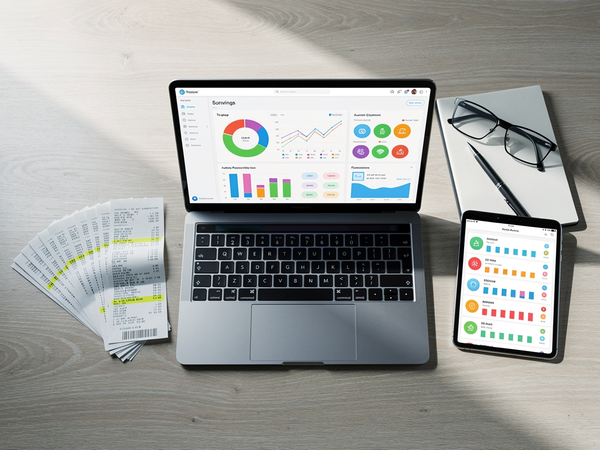Stress-Free Tax Filing: Tips & Strategies for 2025

As tax season approaches, individuals and businesses often experience a whirlwind of emotions—from anxiety to confusion. The task of gathering documents, navigating changing tax regulations, and meeting deadlines can leave even the most organized among us feeling overwhelmed. Preparation is key, not only to ensure compliance with the law but also to safeguard your financial well-being.
Common stressors include:
- The fear of making mistakes
- Underestimating tax liabilities
- Missing out on potential deductions or credits due to hurried or disorganized filing practices.
Moreover, pervasive misconceptions about tax filing—like it being a lengthy process requiring expertise—can amplify stress. However, with the right approach, filing your taxes can be both efficient and manageable. In this article, we’ll share practical tips and strategies to streamline your tax filing process, minimize stress, and empower you to face tax season with confidence. By emphasizing preparation, organization, and leveraging available resources, you can transform tax time from a dreaded obligation into a manageable task.
Understanding Recent Tax Law Changes
Navigating the ever-evolving tax landscape can be daunting, especially with new laws and regulations introduced each year. Staying informed about these changes is crucial, as they can significantly impact your tax liabilities, deductions, and credits.
Recent Updates to Consider:
- Individuals: Adjustments to standard deduction amounts, changes in tax brackets, and modifications to credits like the Child Tax Credit.
- Businesses: Updates on depreciation rules, changes in corporate tax rates, and new provisions for small business owners.
Understanding these changes not only fosters better compliance but also reduces the risk of errors during filing. Specific deductions and credits may have been enhanced or introduced recently, potentially saving you a significant amount. For example, new credits aimed at promoting energy-efficient improvements or pandemic-related relief might apply to you.
Failing to recognize new deductions you qualify for could lead to overpaying taxes or missing out on valuable refunds. Therefore, it’s vital to stay current with tax law changes and consult tax professionals if necessary.
In essence, embracing the latest information on tax law changes equips you to optimize your tax strategy effectively. This proactive approach promotes a stress-free tax season and enhances your financial stability moving forward.
Organizing Your Financial Records for Tax Season
Getting your financial documents in order is crucial for a stress-free tax season. Proper organization reduces anxiety and improves filing accuracy, ensuring you don’t miss out on deductions or credits. Here are some effective strategies:
- Create a Dedicated Space: Establish a specific area in your home for tax-related documents, whether it’s a folder, binder, or box. This will help you locate essential documents easily.
- Collect Important Documents: Gather essential paperwork like W-2s and 1099s as they arrive. Monitor deadlines—typically by the end of January—to ensure you have everything you need before filing.
- Track Your Receipts: Maintain records for business expenses, charitable contributions, or other write-offs. Consider using receipt tracking apps to digitize and store them, reducing physical clutter.
- Use Digital Tools: Embrace technology to manage your income and expenses with spreadsheets or tax software. Many apps enable you to capture documents with your smartphone, organizing them automatically by category.
- Establish an Organization System: Arrange documents logically, categorizing them by type (income, deductions, etc.) and by year. This simplifies the filing process.
- Regularly Update Records: Make it a habit to update your financial records monthly or quarterly, preventing last-minute scrambles at tax time.
- Backup Your Files: Ensure safety by regularly backing up digital records to external drives or cloud services. For physical documents, consider scanning them to create digital archives.
- Review and Reconcile: Before filing, review your organized documents and ensure they align with bank statements and income reports.
By maintaining an organized approach, you significantly reduce stress during tax season and enhance filing accuracy. A well-prepared taxpayer is more likely to capitalize on all available tax benefits, saving both time and money.
Choosing the Right Filing Method for Your Situation
When it comes to filing taxes, selecting the right method can significantly affect your experience. Here’s a closer look at each option:
1. E-filing:
- Pros:
- Speed: Faster processing time means quicker refunds.
- Convenience: File anytime from home.
- Automatic Calculations: Reduced errors due to automatic tax calculations.
- Cons:
- Limited Support: May lack personalized guidance for complex situations.
- Software Fees: Some services charge extra for additional features.
2. Using Tax Software:
- Pros:
- User-Friendly: Step-by-step guidance tailored to various tax situations.
- Cost-Effective: Often cheaper than hiring a professional.
- Access to Resources: Provides explanations of tax laws and deductions.
- Cons:
- Potential for Errors: Complexity can lead to mistakes.
- Limited Human Interaction: Users may need to navigate forums for help.
3. Filing Through a Tax Professional:
- Pros:
- Personalized Advice: Tailored guidance for optimizing deductions and credits.
- Stress Reduction: Less worry about mistakes or missed deadlines.
- Audit Protection: Valuable assistance if audited.
- Cons:
- Higher Costs: Professional services can be pricey.
- Time Consuming: Gathering required documents may take longer.
How to Select the Best Option for Your Needs:
- Complexity of Your Taxes: If your finances are straightforward, e-filing or tax software may be sufficient. For complex situations, consider hiring a professional.
- Comfort with Technology: Tech-savvy individuals may prefer online platforms, while others might seek human interaction.
- Budget Considerations: Weigh the costs against potential savings.
Planning for Important Tax Deadlines
Proper planning for key deadlines is essential, particularly for self-employed individuals or those with multiple income sources. Here’s a guide to important tax deadlines:
Key Tax Deadlines:
- April 15: Deadline for filing federal income tax returns and requesting an extension. For self-employed individuals, it’s also the due date for the first quarterly estimated tax payment.
- June 15: Second quarterly estimated tax payment due for self-employed individuals.
- September 15: Due date for the third quarterly estimated tax payment.
- January 15 (the following year): Final quarterly estimated tax payment.
Missing deadlines can lead to penalties and interest charges, which can accumulate quickly. For instance, failure to file on time can incur a penalty of 5% of unpaid taxes for each month the return is late.
Tips for Staying on Track:
- Set Calendar Reminders: Utilize digital calendars to set reminders before deadlines.
- Use Tax Software: Many programs offer reminders tailored to your tax situation.
- Create a Checklist: Keep a comprehensive checklist of deadlines and tasks.
- Establish a Routine: Regularly review your tax situation to prevent last-minute scrambles.
Planning for tax deadlines can significantly reduce stress and ensure a smoother filing experience.
Maximizing Your Tax Savings with Deductions and Credits
Understanding available deductions and credits can lower your taxable income and tax bill. Here are some common options:
Common Tax Deductions:
- Home Office Deduction: Possible deduction for a portion of your home’s expenses if you work from home, based on the ratio of the home office’s square footage.
- Standard Deduction: For 2023, it's $13,850 for single filers and $27,700 for married couples filing jointly, reducing your taxable income automatically.
- Medical Expenses: Expenditures exceeding 7.5% of your AGI may qualify for a deduction.
Common Tax Credits:
- Education Credits: The American Opportunity Credit and Lifetime Learning Credit can alleviate education expenses.
- Earned Income Tax Credit (EITC): A vital credit for low to moderate-income individuals and families.
- Child Tax Credit: Up to $2,000 per qualifying child, assisting families financially.
How to Apply:
- Document Everything: Keep detailed receipts year-round for easy access.
- Use Tax Software or Consult a Professional: Software can help identify eligible deductions and credits; a professional can provide personalized advice.
- Stay Informed: Knowledge about tax laws and available deductions can lead to significant savings.
Conclusion of Tax Savings Section
By utilizing the available deductions and credits, you can significantly reduce your tax liabilities and make tax season less stressful.
When to Seek Help from a Tax Professional
There are specific scenarios where hiring a tax professional can ease the process significantly:
- Complex Income Situations: Multiple income streams can complicate reporting.
- Major Life Changes: Events like marriage or having a child can impact your taxable situation.
- Business Ownership: Professionals can help navigate the complexities of business deductions and tax structures.
- Real Estate Transactions: Important tax implications are tied to buying or selling property.
- Audits and Tax Issues: Professionals can represent you and guide you through audits.
Advantages of Expert Advice:
- Identification of Deductions and Credits: Knowledgeable professionals can ensure you take full advantage of potential savings.
- Compliance Assurance: They can keep you updated with current regulations.
- Time-Saving: Professionals streamline the filing process.
- Peace of Mind: Reduces stress knowing an expert is managing your taxes.
Preparing for a Successful 2025 Tax Season
Proactive preparation can significantly reduce stress for the upcoming tax season. Here are effective steps to ensure a smoother experience:
- Maintain Organized Records: Create dedicated spaces for financial documents, categorizing and regularly updating them.
- Stay Educated on Tax Law Updates: Subscribe to financial news sources or attend workshops.
- Implement Effective Tax Strategies Throughout the Year: Work with a tax professional proactively instead of waiting for tax season.
By following these steps now, you can alleviate the pressure of last-minute preparation and position yourself for a successful tax filing experience in 2025.
Final Thoughts
In conclusion, filing taxes can be a straightforward task for some but an intricate process for others. By carefully assessing your situation and determining when to seek assistance, you can save money and ensure peace of mind. Remember, thorough preparation and organization can turn tax season into a manageable experience, allowing you to tackle your taxes with confidence and tranquility. Start preparing today for a smoother tax experience tomorrow.





